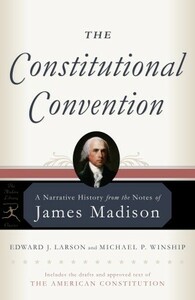Take a photo of a barcode or cover
2 reviews for:
The Constitutional Convention: A Narrative History from the Notes of James Madison
Edward J. Larson, James Madison, Michael P. Winship
2 reviews for:
The Constitutional Convention: A Narrative History from the Notes of James Madison
Edward J. Larson, James Madison, Michael P. Winship
Interesting examination of the creation of the Constitution from a first person account of the deliberation process. It's like you're in the room where it happened!
While the entire collected notes of Madison on the 1787 debates on the Constitution are a daunting and often tedious thing to consider reading, this smaller edition so neatly crafted by Larson and Winship leaves out very little of the meat of the matter but removes enough to make for a very digestible and pleasant experience. I found that having the full edition of Madison's notes handy for further reading on sections which interested me deeply was convenient, and I recommend that anyone who reads this does the same. That being said, I am still giving this all five stars because the editors also include some important sections of the notes of Robert Yates of New York, and they include some helpful summaries of the events of each day. In the back are useful references to the speaking delegates. I believe it is cliche to say that all Americans should read this, but that is a cliche I have to repeat. Many times when people say this kind of cliche they give the impression of implying the Founders were great heroes and statesmen, that the Constitution is, to use a Frederick Douglass quote, "a glorious liberty document", and to bemoan the modern "radical left" for abandoning the angelic founding principles. However, I think to truly read these debates is to bring these deified founders down to a human level, to see them as remarkably similar to the politicians of other eras. They come across as narrow-minded and pedantic on issues pertaining to their local political interests; many of them have prejudices against the poor, against the enslaved and black people, they distrust democracy, and several wish to create a remarkably aristocratic or domineering government. However, some give inspiring tirades calling out the injustices of slave trading and the use of slave labor; some constantly remind their fellow delegates to remember the people and to respect their will by expanding their liberties and equality. Just like today there are many villains but some heroes, but the heroes are flawed and the villains occasionally have a point. Actually reading these debates makes me doubt that many of those who wave them around like a cudgel against the alleged vices and supposedly ill-informed political opinions of modern folk have even read them themselves. These debates, and the founders who engaged in them, readily admit the flaws of the document they are crafting and nobody leaves without some kind of disagreement. Far from a divinely-inspired document, and far from what Frederick Douglass' phrase implies (even though, as he intended his phrase to be a clever method of abolitionist propaganda, and thus in my view entirely justified in its inaccuracy), the Constitution comes across here at its birth as mundane and cynical but nevertheless impressive in combining disparate interests into a more unified whole. To respect the Constitution, flaws and all, after a careful study of its framing is, I argue, far healthier stance for our public to take than blind reverence and evangelical, thought-terminating obsession.

